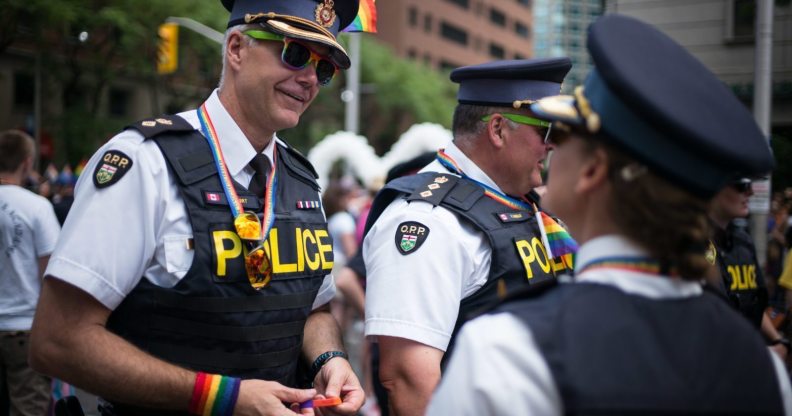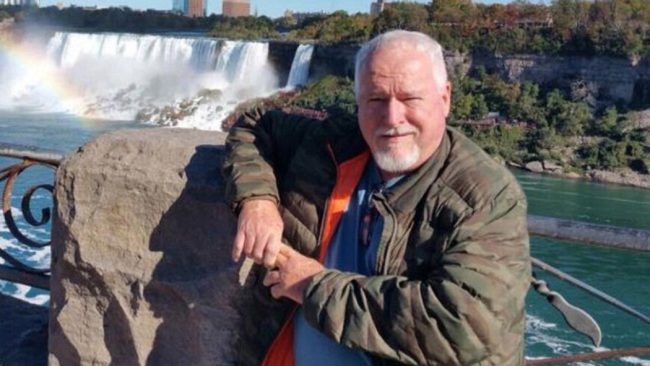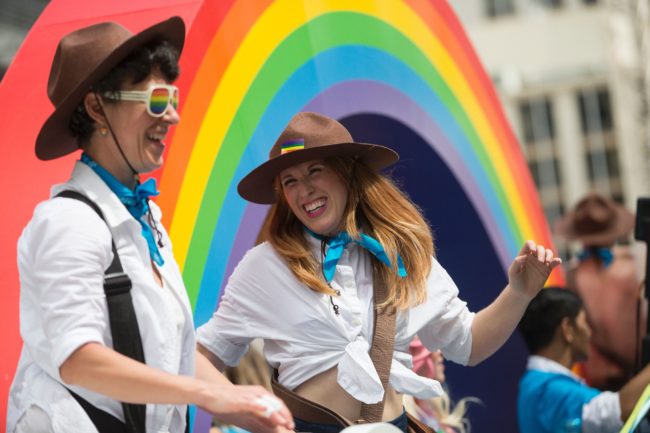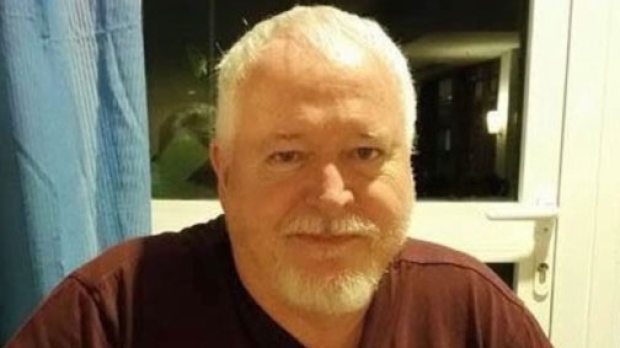Toronto police cancel plans to march at Pride after gay serial killer backlash

TORONTO, CANADA – JULY 3: Ken Leppert (L) of the Ontario Provincial Police, speaks with colleagues at the annual Pride Festival parade, July 3, 2016 in Toronto, Ontario, Canada. Prime Minister Justin Trudeau will make history as the first Canadian PM to march in the parade. (Photo by Ian Willms/Getty Images)
Toronto’s Police Department has cancelled its application to march at the city’s Pride parade, as a backlash continues over their failure to identify serial killer Bruce McArthur sooner.
Serial killer Bruce McArthur was this year charged with the murder of seven men – but was only arrested after years of bungled investigations into mysterious disappearances within the city’s gay community.
LGBT activists have been harshly critical of the police’s actions, alleging that authorities did not take warnings from the community about the suspected murders seriously enough and calling for an urgent inquiry into the failings.
Earlier this week, Toronto Pride released a statement questioning whether it was appropriate for police to march at the festival as the backlash over the case continues.

Bruce McArthur, a 66-year-old self-employed landscaper, has been charged in the murder of seven men (Getty)
In response, Toronto Police Chief Mark Saunders has confirmed the force will be withdrawing from the parade.
He said: “On multiple recent occasions, I have expressed my sincere commitment to the cause of strengthening and renewing the relationship between the Toronto Police Service and our city’s LGBTQ2S community.
“As we have heard from the community itself, we have been through challenging times and it is a personal priority of mine as Chief to build an even more constructive, trusting relationship for the future.
“With this very goal in mind, I had hoped to see our civilians and uniformed officers invited back to march in the 2018 Pride Parade. My hope was that it would demonstrate a shared commitment to progress and healing. In particular, I think of the many members of the Toronto Police Service who identify as LGBTQ2S and who wish to meaningfully participate in unity and inclusion.”

Women with “Mountie” hats dance on a float during the Pride Parade in Toronto, Ontario, June 25, 2017.
The event draws hundreds of thousands of spectators every year. (Photo by GEOFF ROBINS/AFP/Getty Images)
He added: “That being said, I am conscious of the need to avoid any setback that might undermine the principle objective of coming together and restoring confidence. In light of the concerns expressed, I will be withdrawing the application we have made to the organizing committee of the Pride Parade.
“My hope is that this move will be received as a concrete example of the fact that I am listening closely to the community’s concerns and I am committed thoroughly to building a better, stronger relationship between us. Much more work is needed, of course. But hopefully this moment moves us forward in an important way.
“I strongly believe that we should be working toward a time when this issue is no longer a point of controversy and where the participation of our members in the Pride Parade is accepted and welcomed.
“The Toronto Police Service will work hard over the course of the next year toward that end and, ideally, the 2019 Pride Parade will offer an opportunity to demonstrate that progression.”
The previous letter, signed by execs from Toronto Pride and other LGBT groups, had said: “It is an incredibly complex and difficult time. The arrest of Bruce McArthur, the alleged serial killer, has added a new poignancy and a new pain to the fears that sit at the heart of anyone who lives a life of difference.
“At the end of June, we will come together, as we have for decades, and we will be seen. We will rally and rise, but it will be with heavy hearts, as we have not yet begun to grapple with our anger, shock, and grief.
“Majeed Kayhan, Soroush Mahmudi, Dean Lisowick, Selim Esen, Andrew Kinsman, Skandaraj Navaratnam, and a man who remains unidentified. These men were part of our communities and so a part of our family.
“The fact that we did not have the chance to know some of these men as members of our communities speaks to the invisibility and vulnerability that go hand-in-hand with shame and stigma. The disappearances and deaths of Alloura Wells and Tess Ritchie also speak to the marginalization of our communities and the silencing of our concerns.
“The individual stories and lived experiences of each of these people were unique. But what they did share was that the investigations into their disappearances were insufficient, community knowledge and expertise was not accessed and despite the fact that many of us felt and voiced our concerns, we were dismissed.
“This has severely shaken our community’s already often tenuous trust in the city’s law enforcement.
“We feel more vulnerable than ever.”

It added: “We recognise steps have been taken to work in collaboration and consultation to understand what we need to be safe. This will not be accomplished in one day. The relationship cannot be mended through a parade.
“Marching won’t contribute towards solving these issues; they are beyond the reach of symbolic gestures. Our communities live with ongoing, deeply rooted, and historical trauma which has too often been caused by the institutions that claim to represent us. People are scared for themselves and for the lives of their friends and families.
“We are at a pivotal moment where those who suffer from the deepest shame and scantest forms of support could be pushed further from view, deeper into darkness, and closer to danger as a result.
“We request that the Police withdraw their application to march in the 2018 Pride Parade. We believe that our resources are better invested in shared efforts that focus on deeper dialogue, collaborative action, and sustained institutional change. Only a significant commitment and meaningful action can start the critical work of making our communities safer.”
LGBT activists recently called for “an immediate inquiry” into police conduct around an alleged gay serial killer in Toronto.
An investigation is ongoing into police misconduct relating to the McAthur case.

